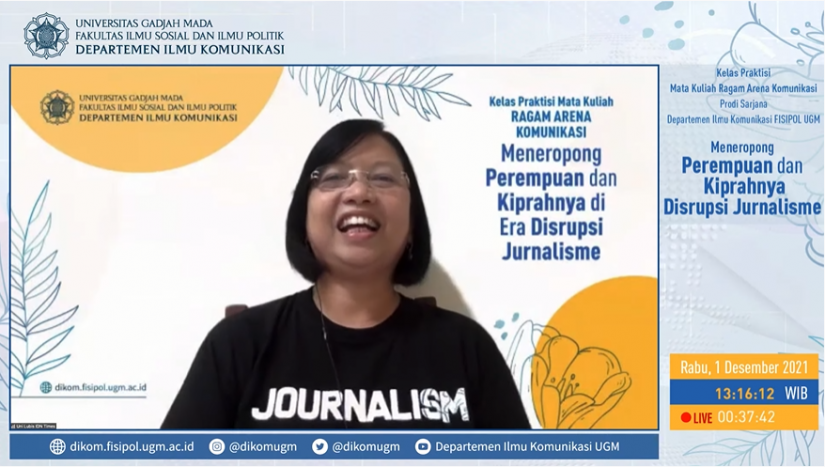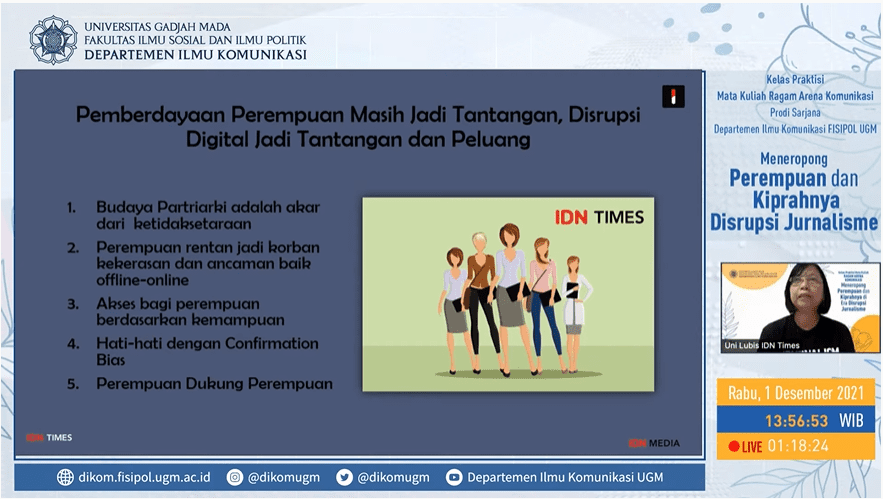
Yogyakarta, December 1st 2021─The Department of Communication Studies UGM held a Different Arena of Communication practitioner class titled Analyzing Women and Their Roles in the Journalism Disruption Era. This class talked about the vulnerability of female journalists in the digital journalism era with Uni Lubis and moderated by Zainuddin Muda Z. Monggilo, a lecturer in UGM Communication studies as well as the lecturer for the class.
Uni, who is currently the Editor in Chief of IDN Times and the Head of Indonesia Female Journalist Forum, felt that the change in the digital era creates opportunities as well as challenges for female journalists. This change creates a 24/7 cycle of news that demands an all-time readiness, both in the aspect of news production as well as consumption. Readers used to passively consume the information given by the media, but now readers can decide which information they’d like to know and find supporting data from the internet.
That is why speed is one of the most valuable aspects of a news story. Not only that, the topic that is being written about should also be tailored to what is popular amongst the public or in social media. All of these changes lead to a competition that disadvantages women. Women are seen sensually and unjustly just so that the news can have more page views or clicks.
On the other hand, for female journalists, working digitally with a 24/7 news cycle can be burdening because there are still household chores that women need to take care of. Working digitally also doesn’t erase the possibility of sexual assault towards women. Female journalists are often victims because of personal aspects that have nothing to do with their professionalism.
“If a female journalist makes an error in a news story, people will be quick to find the data. Then, they will judge that female journalist for her appearance or identity, for example whether she wears a hijab or whether she is pretty or not,” Uni said. According to Uni, the shift towards digital media is actually even more dangerous because there are digital track records that can be saved and tracked.
Additionally, Uni also sees that there is a stereotype attached to female journalists that they can’t handle the weight of the profession. On the contrary, female journalists like Najwa Shihab, Grace Natalie, and Indy Rahmawati are usually the ones who report natural disasters, terorism, and chaotic demonstrations in Indonesia. Female journalists are also not valued for their capability, but they are more valued for other factors such as her family networks.

Despite those stereotypes, there is now already a change in Indonesia’s media ecosystem seen through the rise of female editor in chief. Uni is a member of a WhatsApp group with 21 other female editors in chief.
“Even though it is not perfect yet, we are continually trying to make the situation better. As an editor in chief, we try to correct news that are too vulgar, news that corners women, and especially to protect journalists, including female journalists,” Uni said.
Other than that, Uni said that the digital era creates a democratization opportunity for women to thrive. Female journalists can write more about women’s issues as well as find worthy public issues as a way to show their talent in reporting.
